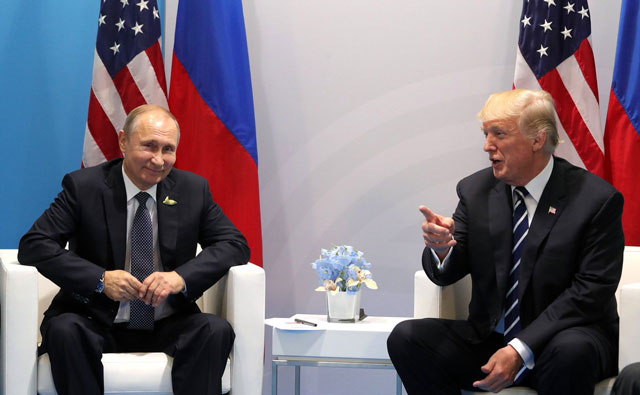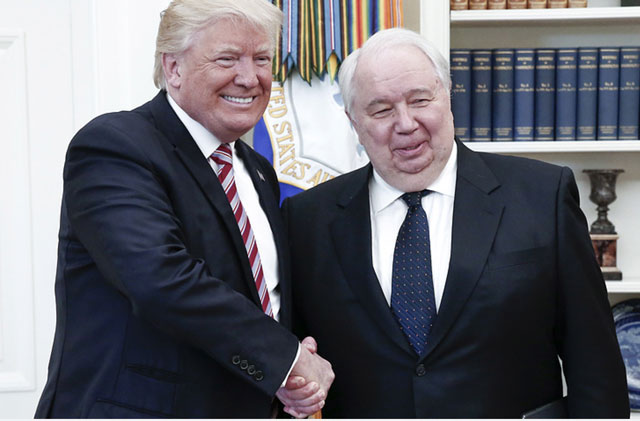
Washington, United States | AFP | President Donald Trump faced new heat Monday after news reports that he has hid from aides the details of discussions with Vladimir Putin and that the FBI investigated him as a potential national security risk who might be acting on behalf of Russia.
Trump has repeatedly stressed that he simply admires strong leaders and is always prepared to work with any of his counterparts.
“I never worked for Russia,” Trump said vehemently on Monday. “I have relationships with almost everybody. That’s a good thing, not a bad thing.”
But critics remain suspicious. Here’s why:
– Business ties –
Beginning in the 2000s, the Trump Organization began marketing US real estate to wealthy Russians, some with Putin links. One particularly lucrative deal raised eyebrows: in 2008, oligarch Dmitry Rybolovlev paid Trump $95 million for a Palm Beach estate that Trump bought for just $41 million four years earlier.
Trump, meanwhile, pressed for years to develop a Trump Tower in the Russian capital. As he ran for president in early 2016, his lawyer Michael Cohen quietly negotiated to gain backing for the billion dollar project, using a former general of Russian military intelligence as a go-between. The effort only ended when Trump won the Republican party’s nomination.
– Campaign contacts with Russia –
During the 2016 election Trump’s campaign had numerous contacts with Russia. Aides sought to arrange a meeting between Trump and Putin. Russian ambassador Sergey Kislyak met Trump briefly in a campaign event and met other advisers during the July Republican convention.
Some campaign associates communicated with WikiLeaks over its publication of damaging Democratic communications allegedly hacked by Russian intelligence.
Campaign chairman Paul Manafort offered to brief oligarch Oleg Deripaska, a Putin ally, on the election, and gave campaign polling data to a Russian business associate with intelligence ties.
And top campaign officials met a Russian lawyer who had offered them dirt on Clinton. Later both sides insisted they only discussed Putin’s ban on American adoptions of Russian orphans.
After Trump’s election victory, in back-channel talks with Kislyak, his future national security advisor Michael Flynn allegedly promised Moscow that Trump would lift sanctions after he takes office despite Russia’s election meddling.

– Russia meddling denial –
Almost as soon as US intelligence concluded that Russia meddled in the 2016 election, Trump has rejected that narrative, putting him at odds with the entire US intelligence community.
He has repeatedly called the Russia meddling probe a “witch hunt”. “It is all a big fat hoax,” he said Monday.
When Trump met Putin in Helsinki in July 2018, he was asked in a joint press conference whether he believes Putin or his own intelligence agencies on Russian interference.
“They think it’s Russia,” said Trump. “I have President Putin —- he just said it’s not Russia. I don’t see any reason why it would be.”
– Counterintelligence probe –
On May 9, 2017, Trump fired FBI director James Comey, after Comey resisted his pressure to halt the investigation of Trump’s campaign and Russia.
One day later, Trump welcomed Russian Foreign minister Sergei Lavrov and Kislyak to the Oval Office. As they met, according to reports, Trump disclosed top secret US information on the Islamic State group that exposed US and Israeli intelligence sources.
At the same meeting, Trump told Lavrov that Comey was “crazy, a real nut job,” according to the New York Times. “I faced great pressure because of Russia. That’s taken off,” with the firing, he said.
The two events together raised deep worries in intelligence circles and ignited the counterintelligence investigation of Trump reported by the Times on Friday.
– Secrecy about Putin meetings –
On Saturday, the Washington Post reported that Trump has purposely left his top aides uninformed about his interactions with the Russian leader.
Trump’s first meeting with Putin was at the G20 summit in Hamburg on July 7, 2017. After the meeting, the Post said, Trump took the translator’s notes and swore her to secrecy. None of his closest aides received any notes on the meeting.
The content of their next meeting, one year later in Helsinki, was also kept from senior officials.
Three days later, Director of National Intelligence Dan Coats said: “I don’t know what happened in that meeting.”
The White House rejected the Post report. “The Washington Post story is so outrageously inaccurate it doesn’t even warrant a response,” said Trump spokeswoman Sarah Sanders. “President Trump has actually been tough on Russia.”
 The Independent Uganda: You get the Truth we Pay the Price
The Independent Uganda: You get the Truth we Pay the Price



